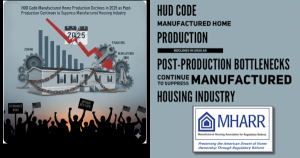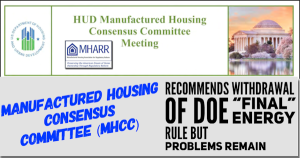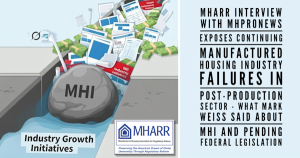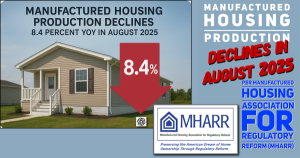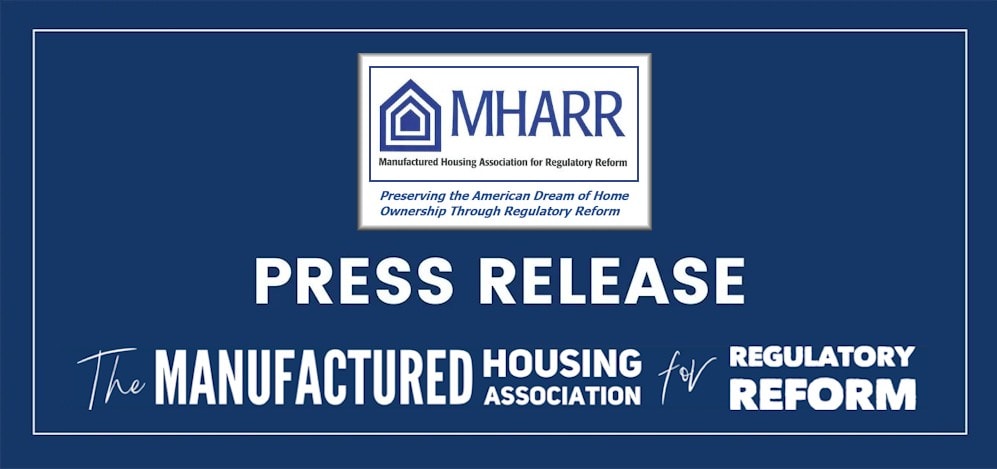
Washington, D.C., June 18, 2025 – The Manufactured Housing Association for Regulatory Reform (MHARR) reports the following.
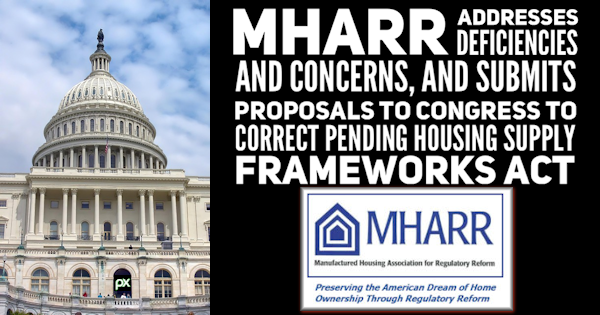
JUNE 18, 2025
IMPORTANT
TO: HUD CODE MANUFACTURED HOUSING INDUSTRY MEMBERS
FROM: MARK WEISS
RE: MHARR ADDRESSES DEFICIENCIES AND CONCERNS,
AND SUBMITS PROPOSALS TO CONGRESS TO
CORRECT PENDING HOUSING SUPPLY FRAMEWORKS ACT
As the Manufactured Housing Association for Regulatory Reform (MHARR) reported in a News Release dated April 22, 2025 (“Bi-Partisan Bill Seeks Zoning Reform – Could Augment Enhanced Federal Preemption”), bi-partisan legislation entitled “The Housing Supply Frameworks Act of 2025” (HSFA), has now been introduced in both the House of Representatives (H.R. 2840) and the U.S. Senate (S. 1299).
At their core, these bills – which are identical in substance but differ slightly in their organization — would establish a federal mechanism to, within three years of enactment, “develop frameworks for best practices on zoning and land-use policies” at both the state and local level. Among other things, the bills specifically reference a “reduction of obstacles to a range of housing types at all levels of affordability, including manufactured and modular housing.” In addition, the legislation, as previously noted by MHARR, would provide state and local governments with resources to confront barriers to affordable housing development and construction.
While MHARR supports the purposes and objectives of these HSFA bills, it nevertheless has serious concerns with certain aspects of the language used in the bills, which – like two draft bills currently before the House of Representatives Subcommittee on Housing and Insurance, addressed in detail in an MHARR memorandum and package dated June 11, 2025 entitled “Pending and Potential Legislation Impacting Manufactured Housing”) – could have significant unintended negative effects for the manufactured housing industry (especially smaller industry businesses) and American consumers of affordable housing if not addressed and corrected during the legislative process.
Consequently, MHARR, in a June 16, 2025 communication to both houses of Congress (copy attached), has indicated the sections of the HSFA bills that pose the greatest concern, and has offered suggested changes to the bill language that would address those concerns. In general, the matters addressed by MHARR fall into four broad categories:
- MHARR proposed changes seek to specifically define “manufactured home” by referencing the definition contained in the National Manufactured Housing Construction and Safety Standards Act of 1974, as amended;
- MHARR proposed changes seek to include “manufactured housing producers” as a distinct membership category for the committee that would be established by the bill;
- MHARR proposed changes would separate references to the regulation and exclusion of federally-regulated HUD Code manufactured homes from references to “modular” or other types of homes built to state or local building codes; and
- MHARR proposed changes would replace references to “attainable” housing with references to “affordable” housing.
Included in the attached MHARR packet are the proposed changes – in detail – together with a statement of the rationale and justification for each.
Most importantly, the proposed changes seek to identify HUD Code manufactured homes as a distinct category of affordable and housing (indeed, the most affordable housing) which faces discrimination and exclusion through zoning and placement mandates precisely because it is regulated pursuant to a federal building code (with performance-based federal standards, uniform federal enforcement and federal preemption), rather than state or local codes (most typically the International Residential Code – IRC). In order to make this distinction clear and unequivocal in the proposed legislation, it is necessary that manufactured homes, as a housing category, be specifically defined and identified in the bill language. Moreover, and consistent with the HSFA’s specific identification and definition of “affordability,” it is essential that HSFA avoid references to the meaningless term “attainable” housing and instead refer in all instances to “affordable” homeownership, which is the centerpiece of President Trump’s and HUD Secretary Scott Turner’s goal to increase the supply of housing and the availability of homeownership in the United States.
As always, MHARR will carefully monitor these bills and will take any and all actions needed to protect the rights and interests of smaller HUD Code industry businesses and the lower and moderate-income American homebuyers who rely on affordable manufactured housing, while simultaneously working to ensure that full and fair competition within the industry is protected.
We urge you to review MHARR’s suggested modifications and support them in your interactions with Congress because, without such changes and additions, the current HFSA bills would likely have unintended and/or unforeseen negative consequences for mainstream manufactured housing, manufactured housing consumers and smaller industry businesses in particular.
Please contact MHARR if you have any questions or need any additional information regarding the attached documents. As usual, MHARR will continue to keep you informed as it reviews and submits recommendations to both houses of Congress on all of the multiple pending or potential bills pertaining to or impacting HUD Code manufactured housing.
Thank you.
Mark Weiss
President and CEO
Manufactured Housing Association for Regulatory Reform (MHARR)
1331 Pennsylvania Ave N.W., Suite 512
Washington D.C. 20004
Phone: 202/783-4087
Fax: 202/783-4075
Email: MHARRDG@AOL.COM
Website: www.manufacturedhousingassociation.org

